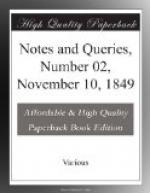“N.B. The copy
of the Baron’s Warres in this edition
differs in
almost every line from that
in the 8vo. edit. 1610.
“It was printed under
the title of Mortimeriados, in 7 line
stanzaes.
“Matilda was first printed 1594, 4to., by Val. Simmes. Gaveston appears by the Pref. to have been publish’t before. Almost every line in the old 4to. of Matilda differs from the copy in this edit. A stanza celebrating Shakespeare’s Lucrece is omitted in the later edition.
“Idea. The Shepherd’s
Garland. Fashion’d in 9 Eglogs. Rowland’s
sacrifice to the 9 Muses,
4to. 1593. But they are printed in this
Edition very different from
the present Pastorals.
“A sonnet of Drayton’s
prefixed to the 2nd Part of Munday’s
Primaleon of Greece, B.L.
4to. 1619.”
[The stanza in Matilda, celebrating Shakespeare’s Lucrece, to which Dr. Farmer alludes, is thus quoted by Mr. Collier in his edition of Shakespeare (viii. p. 411.):—
“Lucrece, of whom proud Rome hath
boasted long,
Lately revived to live
another age,
And here arrived to tell of Tarquin’s
wrong,
Her chaste denial, and
the tyrant’s rage, {29}
Acting her passions on our stately stage:
She is remember’d,
all forgetting me,
Yet I as fair and chaste
as e’er was she;”—
who remarks upon it as follows:—
“A difficulty here may arise out of the fifth line, as if Drayton was referring to a play upon the story of Lucrece, and it is very possible that one was then in existence. Thomas Heywood’s tragedy, The Rape of Lucrece, did not appear in print until 1608, and he could hardly have been old enough to have been the author of such a drama in 1594; he may, nevertheless, have availed himself of an elder play, and, according to the practice of the time, he may have felt warranted in publishing it as his own. It is likely, however, that Drayton’s expressions are not to be taken literally; and that his meaning merely was, that the story of Lucrece had lately been revived, and brought upon the stage of the world: if this opinion be correct, the stanza we have quoted above contains a clear allusion to Shakespeare’s Lucrece; and a question then presents itself, why Drayton entirely omitted it in the after-impression of his Matilda. He was a poet who, as we have shown in the Introduction to Julius Caesar (vol. viii. p. 4.), was in the habit of making extensive alterations in his productions, as they were severally reprinted, and the suppression of this stanza may have proceeded from many other causes than repentance of the praise he had bestowed upon a rival.”]
* * * * *
BODENHAM, OR LING’S POLITEUPHUIA.
Sir,—The following is an extract from a Catalogue of Books for sale, issued by Mr. Asher, of Berlin, in 1844:—




